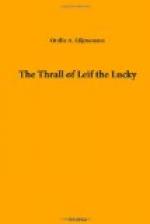In the madness of his rush, Alwin blundered. Springing upon Egil from the left, he left his enemy’s right arm free. Instantly this arm began forcing and jamming its way downward across Egil’s body. Should it find what it sought—!
Alwin saw what was coming. He set his teeth and struggled desperately; but he could not prevent it. Another moment, and the Black One’s fingers had closed upon his sword-hilt; the blade hissed into the air. Only an instant wrenching away, and a lightning leap aside, saved the thrall from being run through. His short bronze knife was no match for a sword. He gave himself up for lost, and stiffened himself to die bravely,—as became Earl Edmund’s son. He had yet to learn that there are crueler things than sword-thrusts.
As Egil advanced with a jeering laugh, Helga caught his sleeve; and Rolf laid an iron hand upon his shoulder.
“Think what you do!” the Wrestler admonished. “This will make the third of Leif’s thralls that you have slain; and you have no blood-money to pay him.”
“Shame on you, Egil Olafsson!” cried Helga. “Would you stain your honorable sword with a thing so foul as thrall-blood?”
Rolf’s grip brought Egil to a standstill. The contempt in Helga’s words was reflected in his face. He sheathed his sword with a scornful gesture.
“You speak truth. I do not know how it was that I thought to do a thing so unworthy of me. I will leave Valbrand to draw the fellow’s blood with a stirrup leather.”
He turned away, and the others followed. Those of the crew who had raised their muddled heads to see what the trouble was, laid them down again with grunts of disappointment. Alwin was left alone, untouched.
Yet truly his anguish would not have been greater had they cut him in pieces. Without knowing what he did, he sprang after them, crying hoarsely: “Cowards! Churls! What know you of my blood? Give me a weapon and prove me. Or cast yours aside,—man to man.” His voice broke with his passion and the violence of his heart-beats.
But the mocking laughter that burst out died in a sudden hush. A moment before, Sigurd had concluded his pursuit of the thieving hound and rejoined the group,—in time to gather something of what had passed. The instant Alwin ceased, he stepped out and placed himself at the young thrall’s side. He was no longer either the courteous Sigurd Silver-Tongue or Sigurd the merry comrade; his handsome head was thrown up with an air of authority which reminded all present that Sigurd, the son of the famous Jarl Harald, was the highest-born in the camp.
He said sternly: “It seems to me that you act like fools in this matter. Can you not see that he is no more thrall-born than you are? Or do you think that ill luck can change a jarl’s son into a dog? He shall have a chance to prove his skill. I myself will strive against him, to any length he chooses. And what I have thought it worth while to do, let no one else dare scorn!”




